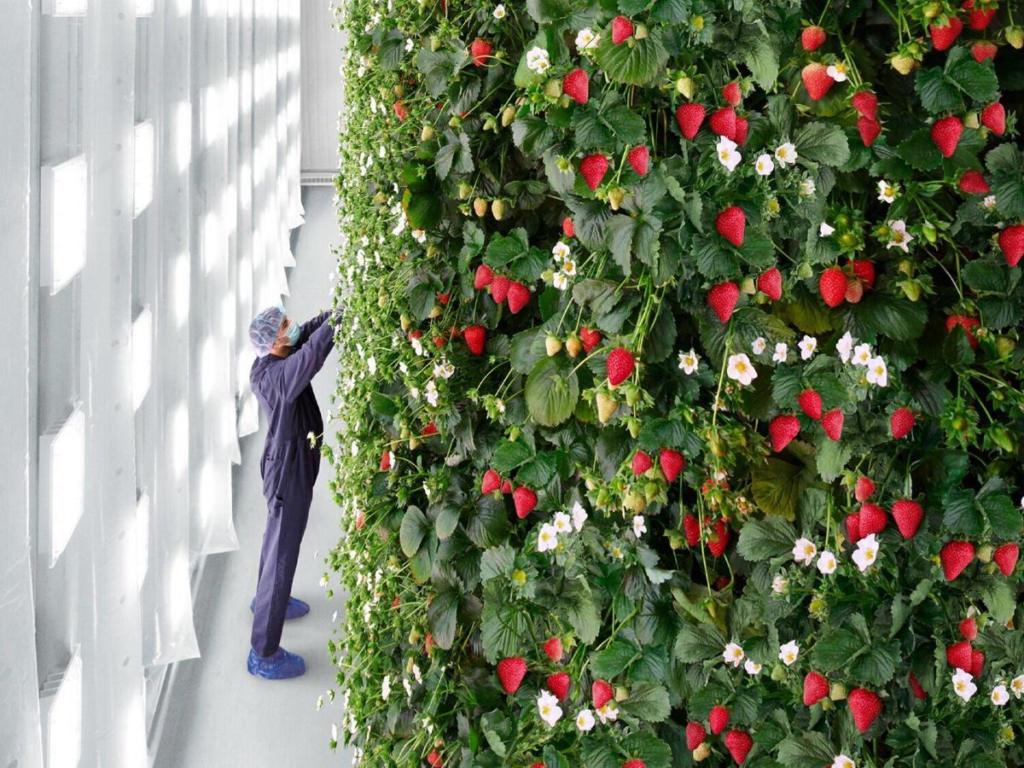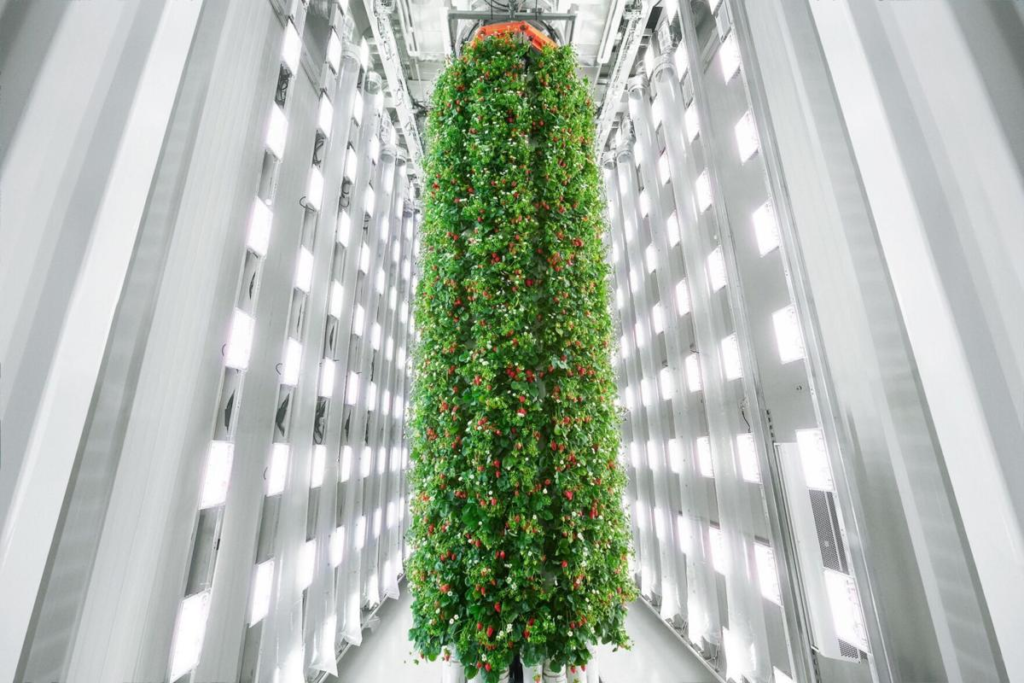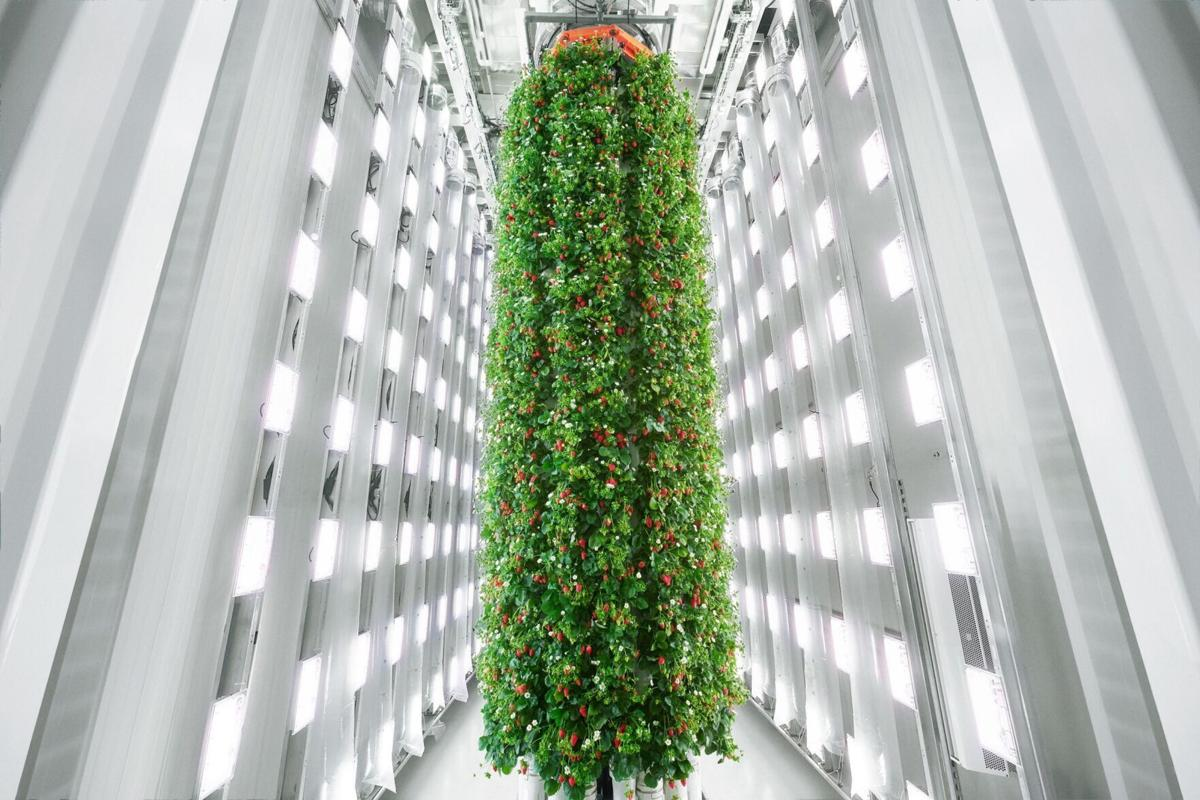The world’s first large-scale vertical berry farm has officially opened in Richmond, Virginia, marking a revolutionary step forward in agriculture. This innovative project, spearheaded by Plenty Unlimited Inc., in collaboration with Driscoll’s, is dedicated to growing strawberries in a controlled, high-tech environment.
Designed to produce over 4 million pounds of strawberries annually in just under 40,000 square feet, the vertical berry farm aims to supply premium strawberries year-round, with the first harvest expected in early 2025.
Revolutionizing Strawberry Production with Vertical Farming
Unlike traditional farms, this vertical berry farm utilizes cutting-edge technology to eliminate the challenges of unpredictable natural conditions. Plenty’s farm relies on 30-foot-tall vertical towers that house crops in a controlled environment, enabling them to thrive regardless of external weather patterns.

Read : Scientists Spot Dangerous Bulge Around Mountain of God Volcano: Warns of Massive Eruption
With the help of artificial intelligence, the farm manages critical growth factors like temperature, humidity, and light exposure, ensuring optimal conditions for each strawberry plant. This AI-driven system processes millions of data points daily to ensure that crops receive exactly what they need to grow consistently high-quality strawberries.
Read : Restricted area : places where humans can’t entre
The vertical berry farm approach also enhances pollination, which is crucial for ensuring the uniformity of the fruit. Traditional pollination methods are replaced with an engineered airflow system, improving efficiency and further contributing to the consistent size, shape, flavor, and texture of the strawberries.
With such precise control, the vertical berry farm promises to offer consumers strawberries that meet the highest standards year-round.
Sustainable Agriculture in Action
One of the most impressive aspects of this vertical berry farm is its sustainability. The facility uses up to 90% less water and 97% less land than traditional farming methods, making it a model for environmentally friendly food production.

In a world where sustainable agriculture is becoming increasingly necessary, Plenty’s vertical berry farm demonstrates that large-scale food production can be both efficient and eco-friendly.
This Richmond-based farm also addresses the issue of food miles. Located within a day’s drive of over 100 million consumers, the farm can reduce the distance food travels from farm to table. This proximity not only ensures fresher produce for consumers but also minimizes food waste, as less time is spent in transportation.
The benefits of this vertical berry farm extend beyond just the environment—local agricultural output gets a significant boost, while reducing food miles promotes sustainability and freshness.
Virginia’s Role in the Future of Vertical Farming
Virginia’s strategic importance in agriculture played a pivotal role in the decision to open the vertical berry farm in Richmond. As the largest private sector industry in the state, agriculture is central to Virginia’s economy.

The state’s leadership in controlled environment agriculture aligns perfectly with Plenty’s mission to revolutionize food production through technology. By investing in this vertical berry farm, Plenty is not only contributing to local economic growth but also helping position Virginia as a leader in sustainable agriculture.
The partnership between Plenty and Driscoll’s reflects a shared vision for the future of farming. While vertical farming has traditionally focused on leafy greens, Plenty’s modular system has been refined over the past decade to support a broader variety of crops, including strawberries.
This collaboration also aims to meet the growing consumer demand for premium berries in the Northeast, the largest berry consumption region in the U.S. By growing these high-quality berries closer to consumers, the vertical berry farm ensures a fresher, more sustainable product.
let’s enjoy few years on earth with peace and happiness….✍🏼🙏


Your point of view caught my eye and was very interesting. Thanks. I have a question for you.
Your article helped me a lot, is there any more related content? Thanks!
Your point of view caught my eye and was very interesting. Thanks. I have a question for you. https://www.binance.com/bn/join?ref=UM6SMJM3
Thank you for your sharing. I am worried that I lack creative ideas. It is your article that makes me full of hope. Thank you. But, I have a question, can you help me?
I don’t think the title of your article matches the content lol. Just kidding, mainly because I had some doubts after reading the article.
Your point of view caught my eye and was very interesting. Thanks. I have a question for you.
I don’t think the title of your article matches the content lol. Just kidding, mainly because I had some doubts after reading the article.
Thanks for sharing. I read many of your blog posts, cool, your blog is very good.
Your point of view caught my eye and was very interesting. Thanks. I have a question for you.
Thank you for your sharing. I am worried that I lack creative ideas. It is your article that makes me full of hope. Thank you. But, I have a question, can you help me?
Your point of view caught my eye and was very interesting. Thanks. I have a question for you.
Your article helped me a lot, is there any more related content? Thanks!
Your article helped me a lot, is there any more related content? Thanks!
Your article helped me a lot, is there any more related content? Thanks!
Your point of view caught my eye and was very interesting. Thanks. I have a question for you.